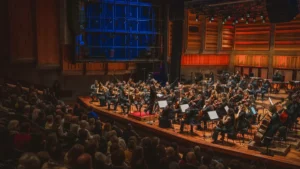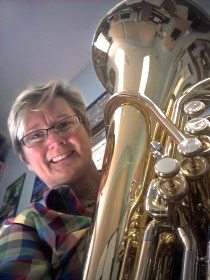Hope you are keeping cool this July! Here’s some news!

Chineke! Orchestra playing at Queen Elizabeth Hall. Credit: Southbank Center
The Chineke! Orchestra announced its 2024–2025 season. On October 9th in the Queen Elizabeth Hall at Southbank Centre (London) they will perform Eleanor Alberga’s Overture, Jupiter’s fairground, Avril Coleridge-Taylor’s Sussex Landscape Op. 27, Valerie Coleman’s Concerto for Wind Quintet & Chamber Orchestra “Phenomenal Women” which takes its title from the poem by Maya Angelou, and the UK premiere of Florence Price’s Symphony No.4 in D minor. Jeri Lynne Johnson will conduct the orchestra, and the soloists will be announced in the coming weeks.
On June 28, 2024, the Dallas Symphony Orchestra announced the appointment of Michelle Miller Burns as its next president and chief executive officer (the Ross Perot President and CEO). Burns’s tenure will begin on September 23, 2024. Her previous position was with the Minnesota Orchestra, which she held from 2018.
Gail Robertson has been appointed visiting professor of euphonium at Indiana University Bloomington. While not traditionally an orchestral instrument, the euphonium plays prominent roles in important 20th and 21st-century repertoire as the required or optional soloist, including Gustav Holst’s The Planets, the tone poems of Richard Strauss, and Gustav Mahler’s seventh symphony. Robertson’s appointment is an important moment for women the brass world in particular: one of her D.M.A. supervisors at Michigan State University was Ava Ordman—a trombonist and prominent advocate for music by women—and she will bring the number of women on IU’s brass faculty to three, joining Brittany Lasch (trombone), Denise Tryon (horn).
Given the continuing climate of misogyny and sexual harassment in the classical music industry that is being exposed by the intrepid Katherine Needleman (BTW, she is now on Substack, as well as Facebook, and her own website) it is important that a renowned school of music have a critical mass of women faculty, particularly in the traditionally male bastion of the brass world.
Analysis of the Donne Women in Music 2024 Diversity Report continues. The report, released in late June of this year, analyzed 16,327 compositions scheduled for performance by 111 orchestras in 30 countries during the 2023–2024 orchestral season. Donne also maintains the Big List of Women Composers, featuring 5,000 women composers and counting from the pre-medieval to the 21st century. Lisa Hirsch reports that the orchestras of the world have received a “D for Dismal” on their report card for diversity, and the report’s numbers bear that out: 7.5% of the total works surveyed were composed by women (5.8% by white women and 1.6% by women of color). This is compared to the remaining 92.5% of works by men with 3.2% of the total surveyed by men of color. The statistics only become more grim as they progress: 78.4 pieces were composed by white men (living or dead); the “Top 10” composers were all dead white European men, and accounted for 30.6% of total performed works; the “Top 25” composers were also all white and European, and all dead with the exception of John Williams, and accounted for 50.6% of the total works surveyed. The full report can be viewed here. (PDF)
Other organizations measure the numbers of programming works by women in classical music. The most recent Institute for Composer Diversity (ICD) report measures programming diversity in 189 US orchestras from 2016–2023, and can be read here. Women’s Philharmonic Advocacy’s own Sarah Baer has recently reported on the 2024–2025 programming announcements from 21 major US orchestras. In her research, Baer writes that, “These [21] ensembles, those with the highest operating budgets in the country, and with the most to gain and least to lose by incorporating new programming and leading the charge in real change, have demonstrated that their supposed commitment to performing works by women was an opportunistic publicity grab. While they are happy to perform works by women when it suits them, there is no larger impetus for larger, systemic changes.”
It has been remarked here and elsewhere that the summer of 2024 has seen an abundance of women conductors in the spotlight—winning fellowships and mentorships, ascending the podiums of international festivals, and securing orchestral work. If this trend continues, then perhaps the near-future reports of Donne, the ICD, and others may begin to look very different — if of course they are committed to diverse programming. In the past we know there were women conductors who did not want it assumed that they were interested in performing works composed by women, to avoid being “pigeonholed” in a “specialist niche.”
Let us know what you’re listening to! Email us at info@wophil.org We’d love to hear from you!

